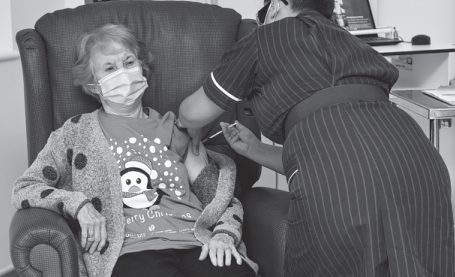Vaccine rollout gets underway in UK

A 90-year-old woman from Northern Ireland became the first person in the world to receive the Pfizer and BioNTech COVID-19 vaccine outside of a trial as the United Kingdom's mass vaccination program began on Tuesday.
But enthusiasm for the vaccine was tempered by a warning from Britain's medicine regulator that people with a history of significant allergic reactions should not get the Pfizer jab. The Medicines and Healthcare Products Regulatory Agency issued the "precautionary "advisory after two people reported adverse effects on the first day of the rollout.
Margaret Keenan, who turns 91 next week, was given the jab at University Hospital in Coventry, and called it the "best early birthday present".
Around 800,000 doses should be given over the coming weeks, with over-80s and selected health and care staff at the front of the queue. Up to 4 million doses are to be distributed by the end of the month.
"I feel so privileged to be the first person vaccinated," said Keenan.
Chaand Nagpaul, chair of the British Medical Association, told Sky News the vaccination was a "landmark moment" in combating the disease. "But we need to be honest in that this is going to pose a huge logistical challenge for our health service," he added.
"More public health advice needs to be put out because this really is fundamental to how you treat a viral pandemic … so there are quite a lot of challenges ahead."
Uncertainties hang over another soon-to-be dispensed vaccine.
Earlier this year, the government vaccine task force said it hoped that around 30 million doses of a vaccine from Oxford University and Astra-Zeneca would be made in the UK by the end of the year, and it was reported that it had suggested the packaging should carry the union flag.
Numbers reduced
But now the reduced number of early doses will have to be imported from Germany and the Netherlands.
"There have been some (UK manufacturing) challenges," said Ian McCubbin, the task force's manufacturing lead, told a news conference on Monday.
Details of the extent and time scale of vaccination programs have also been hard to clarify. Last month, a National Health Service document leaked to the publication Health Service Journal said anyone in the country wanting the injection should receive it by the end of April, although it was suggested this target was already out of date.
The head of the UK vaccine task force, Kate Bingham, says vaccines could be used in a "mix and match "trial in the new year, to see how effectively they could work together.
Scientists in the Netherlands are conducting experiments at the country's biggest soccer stadium which could result in large numbers of spectators being allowed back into sporting arenas and concert halls.
The experiment at the Johan Cruyff Arena in Amsterdam is to see how saliva-like droplets produced by cheering fans might spread the novel coronavirus in the air.
People in the UK may also have to wear face masks for another year despite the national vaccination program getting under way, The Telegraph reported, citing chief scientific adviser Patrick Vallance. Restrictions may remain in place long after a full rollout of a vaccine, Vallance suggested, according to the report.
Other countries are also kicking off vaccination programs.
Mexico's Deputy Health Minister Hugo Lopez-Gatell said on Tuesday that vaccination should begin "in the last days of the third week of December," starting from the capital Mexico City, home to some 20 million residents, and northern Coahuila state.
In Israel, the government plans to vaccinate its population from Dec 20, state-owned Kan News quoted the director-general of the Israeli Health Ministry as saying, adding medical staff are expected to receive a vaccine even before that date.
The country confirmed the purchase of 8 million doses of the vaccine from Pfizer last month.
Xinhua and agencies contributed to this story.

Today's Top News
- Macao SAR holds flag-raising, reception to mark 26th anniversary of return to motherland
- China issues rules to regulate pricing practices of internet platforms
- US hits over 70 IS-linked targets in Syria in massive retaliatory strikes
- Technological innovation brings cultural heritage alive
- Consumption to play bigger part in growth
- Opposition moves to impeach Lai






























